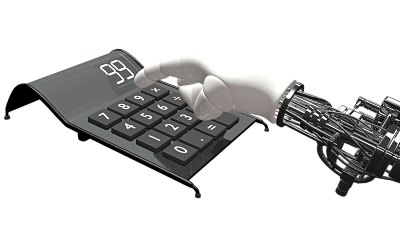How Will Artificial Intelligence Impact Your Work
Artificial Intelligence is all the buzz these days. Are you curious to know more and how it could effect your job in the future?
So, what is Artificial Intelligence (AI)? AI is a branch of computer science dealing with the simulation of intelligent behavior in computers. Essentially, robots that learn and perform human-like tasks.
We all have been exposed to AI. You probably use it on a regular basis. Having a conversation with “Siri” on your smartphone, using voice to text to send messages, and checking your news feed on social media. AI is running behind the scenes to complete those tasks.
Artificial Intelligence is nothing new. In fact, it has been around for decades. But nowAI is disrupting industries and changing the labor market.
Uber is a prime example of how new technology using AI has successfully provided people with a new ride sharing service that decimated the taxi industry making it obsolete.
As AI continues to get better, faster, and more human-like, the landscape of the workforce will continue to change.
A survey by Pew Research Internet found that “Americans are roughly twice as likely to express worry (72%) than enthusiasm (33%) about a future in which robots and computers are capable of doing many jobs that are currently done by humans.”
In my opinion, the thing that workers worry about most is being replaced by robots and becoming permanently unemployed.
So, what jobs are most at risk?
According to a recent study by Oxford University, these jobs are most likely to be automated:
- Data Entry Keyers
- Library Technicians
- New Account Clerks
- Photographic Process Workers and Processing Machine Operators
- Tax Preparers
- Cargo and Freight Agents
- Watch Repairers
- Insurance Underwriters
- Mathematical Technicians
- Hand Sewers
- Title Examiners, Abstractors, and Searchers
- Telemarketers
These Jobs are least likely to be automated:
- Recreational Therapists
- First-Line Supervisors of Mechanics, Installers and Repairers
- Emergency Management Directors
- Mental Health and Social Workers
- Audiologists
- Occupational Therapists
- Orthotists and Prosthetists
- Oral and Maxillofacial Surgeons
- Lodging Managers
- Dieticians and Nutritionists
- Choreographers
- Sales Engineers
- Instructional Coordinators
- Physicians and Surgeons
- Psychologists
- Elementary School Teachers
- Dentists
- First-Line Supervisors of Police and Detectives
Experts who follow labor industry trends are quick to point out that jobs that require repetitive, monotonous tasks, are more likely to be susceptible to automation.
While jobs that require complex tasks or utilize higher level skills, such as creativity, problem solving, and social intelligence are likely to be safe from automation.
A paper published by Erik Brynjolfsson and Daniel Rock from MIT and Tom Mitchell with Carnegie Mellon University reports that AI will replace tasks, not jobs.
They state that “few jobs can be fully automated using machine learning.” In other words, certain tasks can be automated, but computers are not able to perform ALL the necessary functions required of most jobs.
So, how can you stay ahead of the robots and be more secure in your career?
Brynjolfsson and colleagues offer reassurance that people can focus on “the redesign of jobs and re-engineering of business processes.”
So, rather than worry about robots taking over and fearing unemployment, you can refocus and seek out ways to redesign the work that you do.
Plan for the future
Think about all the tasks and duties you do in your job on a daily or weekly basis. Can any of these tasks be performed better or faster with automation?
What tasks involve more complex, critical, or deeper social thinking performed better by humans?
Take an inventory of all the things you do at your job. This will help you get a better idea of what is likely to change in your job as AI re-shapes your industry.
What skills do you have that give you an advantage over a computer?
What new skills do you need to learn that will help you stay relevant?
Realize that you will be better off if you PREPARE for the future and learn to ADAPT to change.
If you continue to learn and develop new skills that you can do better than robots, you will have the upper hand while leaving the monotonous (and likely boring) tasks for the bots to do.
Want help managing your career?
Contact Jolie to schedule a career planning consultation.
© 2019. Jolie Steers. ALL RIGHTS RESERVED.



